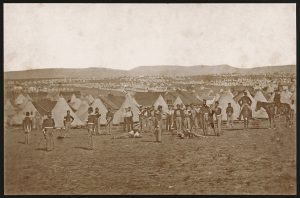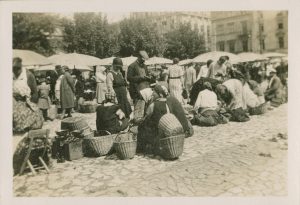January 8, 2018, by Kathryn Steenson
Looking back to get ahead: Volunteering at Manuscripts and Special Collections
This is a guest post by third-year American Studies and History student Bron Bury.
Your future
As a student, regardless of what stage you are at in your degree, making an conscious effort to look beyond your time in education is key in maximising your future opportunities . You may have a vague idea of what transferable skills you have already developed, but can you name an example of when you applied them to a task beyond your degree? For many, prior to their graduation the answer is no. That is, however, unless you consider your time management skills of balancing your Netflix obsession with a healthy dose of Crisis and Ocean on a Wednesday and Friday. However, volunteering at Manuscripts and Special Collections provides an opportunity hone the strengths you already possess, as well as develop new skills related to the heritage sector.
As part of the Experience Heritage Module included in the Nottingham Advantage Award, I have spent the autumn semester working in both outreach and digitisation as part of my placement. The heritage sector has long been an appealing career route for me, and here was an opportunity to gain valuable work experience within the University itself. From the outset, my supervisor Kathryn Steenson made feel like my contributions would help make a real difference within the department. Unlike what you might hear from some internship horror stories, I was not here to be a delivery man for Costa.
Reaching out

Photograph of the Camp of the 97th Regiment before the Siege of Sevastopol, c. Sep. 1855 (Ne C 10884/2/13)
Manuscripts and Special Collections has made a conscious effort to promote its vibrant array of documents, and one of my primary tasks within the outreach component of my placement was to do just that. Whilst utilizing a collection of photographs taken by James Robertson and Felice Beato during the Crimean War of 1853-6, I was able to combine the content of my own degree with the role itself. As part of my display for the reading room at King’s Meadow Campus, I sought to emphasise how such pictures can completely change a viewer’s preconception of a war. Thus, not only did the display encourage observers to take the time to consider the range of materials that are preserved here at the University, but also to realise how they can be of value to their own research. Ultimately, the collective efforts of the department enables a complex event such as the Crimean War to be taken from the margins of British history to be placed at the centre of public attention.
Not bad for a few pictures from the 1850s.
Getting technical
Once documents have gone through conservation they are then available to be catalogued and digitised for future use. Working alongside Mark Bentley, the digitisation technical officer, my role here was related to scanning and adding metadata for a collection of photo albums requested by a geography field group. Here, I developed a number of new practical skills related to the use of Adobe Photoshop and also within the database operated by Manuscripts and Special Collections. I was also fascinated by the photo albums themselves which included a selection of images from Poland during the 1930s. Most people are familiar with the treatment of Poland during the Second World War, and the sense innocence within the individuals pictured is made all the more poignant against our knowledge that the country was soon to be invaded in 1939. When working in digitisation I was also offered the opportunity to meet Sir Andrew Witty, Chancellor of the University of Nottingham and former CEO of GlaxoSmithKline. Rarely does the opportunity arise to meet the Chancellor, however, through this placement I was able to discuss the value of such work experience for students and have an insightful conversation with our current Chancellor.
The future
What is unique about a placement in Manuscripts and Special Collections? Not only will you feel rewarded by the fact that you are gaining valuable work experience, but also that each and every task you undertake is helping to preserve and protect the past. With an extremely supportive and insightful team around you, the placement will give you a clear understanding of how this continually evolving sector works and how you could to be a part of it in the future.
No comments yet, fill out a comment to be the first


Leave a Reply